|
बी एड - एम एड >> बी.एड. सेमेस्टर-1 प्रश्नपत्र-IV-B - वैल्यू एण्ड पीस एजुकेशन बी.एड. सेमेस्टर-1 प्रश्नपत्र-IV-B - वैल्यू एण्ड पीस एजुकेशनसरल प्रश्नोत्तर समूह
|
5 पाठक हैं |
||||||
बी.एड. सेमेस्टर-1 प्रश्नपत्र-IV-B - वैल्यू एण्ड पीस एजुकेशन (अंग्रेजी भाषा में)
Question- Discuss the Impact of World War I on India.
Answer -
World War and India
Although not a direct participant, India could not escape the effect of the war. The World War affected Indian society and economy profoundly.
However, the war had a different impact on different sections of the population.
- Among the poorer class of Indians, it meant increased misery and impoverishment.
- Heavy taxation was imposed on the people.
- War demands created a scarcity of agricultural products and other daily necessities, leading to a phenomenal increase in prices.
- Driven to desperation, people became ready to join any movement against the government.
- Consequently, the war years became years of intense nationalist political agitation.
- Soon, India witnessed a massive mass movement called the Non-Cooperation Movement, led by Gandhi.
On the other hand, the war brought fortunes for the industrialists.
- It created an economic crisis in Britain, and for war demands, they had to depend on Indian industries.
- The Jute industry, for example, flourished during this period.
- In this way, the war promoted the industrial advancement of India.
Indian industrialists took the maximum advantage of the opportunities offered. They made fortunes and wanted to preserve them, even after the war came to an end.
For this reason, they were prepared to organize themselves and support the organized nationalist movement.
Thus, the war helped in bringing about a wave of nationalism among various sections of the population, although through different processes.
India’s independent economic advancement also began to take shape, which was to grow in the coming years.
-
India, being a former British colony, played a vital role in helping Britain and its allies win over Germany and allies, a role that is often overlooked.
-
Being a British colony, the Indian Army contributed a large number of soldiers to the European, Mediterranean, and Middle Eastern conflicts during World War I.
-
The Indian Army fought against the German Empire in East Africa and also on the Western Front.
-
They served in places as diverse as France and Belgium, Mesopotamia, Egypt, Gallipoli, Palestine, and Sinai.
-
More than 70,000 Indian soldiers who served Britain in World War I lost their lives.
- Sir Claude Auchinleck, Commander-in-Chief of the Indian Army, once said:
“Britain couldn’t have come through the wars if they hadn’t had the Indian Army.”
- Sir Claude Auchinleck, Commander-in-Chief of the Indian Army, once said:
-
As high as 100 million British Pounds was given by India to Britain to fund their war, anticipating dominion status and home rule in return.
-
The British raised men and money from India, as well as large supplies of food, cash, and ammunition, collected by British taxation policies.
- In return, the British promised self-rule to India at the end of the war, which eventually was not delivered.
However, the “war to end all wars” turned out to be the opposite.
By ensuring Germany’s economic ruin and political humiliation through the Treaty of Versailles, the post-war settlement provided fertile ground for World War II.
|
|||||













